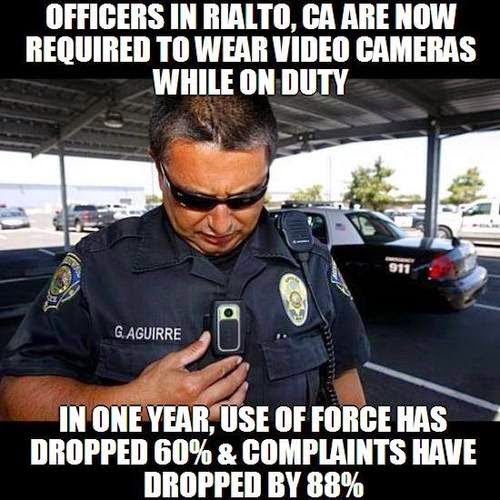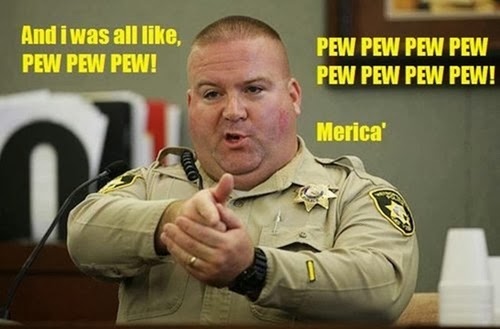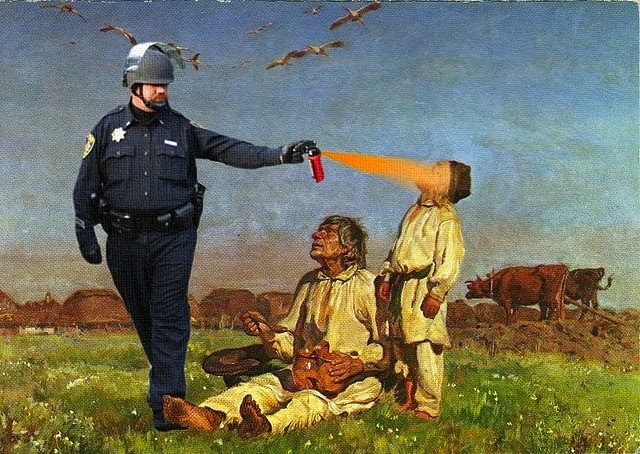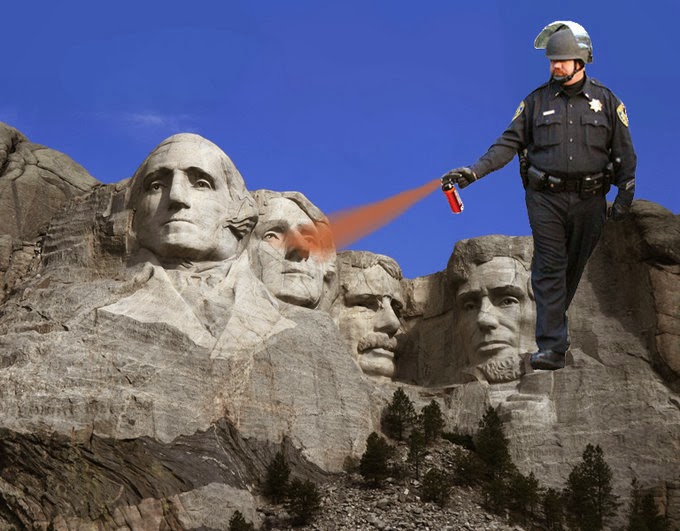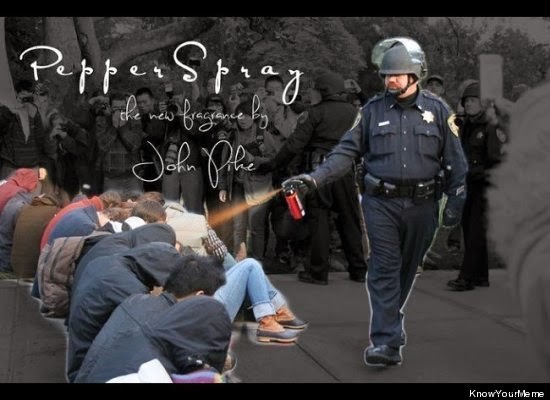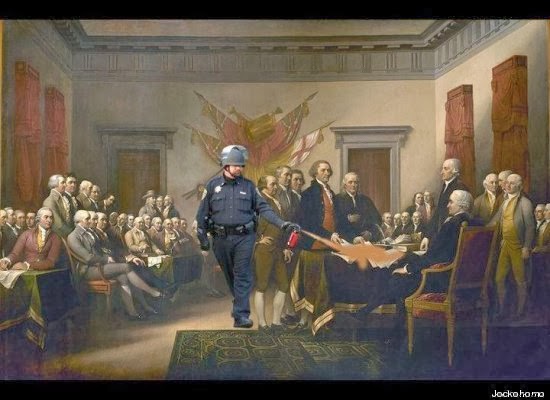License Plate Readers at Center of Legal Dispute in Fairfax County
Brought to you by………
John Foust. Because even moral cowards need a
job
“When the cops murdered unarmed
citizens, secretly recorded public officials and held the people of this county
in contempt, I said and did nothing. I was silent in the face of injustice. And
now I expect you idiots to reelect me”
About Supervisor John W. Foust
John was elected to the Board of
Supervisors in 2007 and re-elected in 2011. In all that time he has never, not
once, spoken out against the brutality, corruption, excessive power or bloated
budget of the Fairfax County Police.
However he did find time to run
for reelection several times and run a losing bid for congress.
Since joining the Board of
Supervisors, John has sought to provide effective, results-oriented, common
sense leadership for the residents of the Dranesville District and Fairfax
County…..in as long as providing effective, results-oriented, common sense
leadership doesn’t involve speaking out against the cops.
License Plate Readers at Center
of Legal Dispute in Fairfax County
ACLU is defending a Fairfax
County man who says police department is unlawfully collecting information on law-abiding
Virginians.
By MARY ANN BARTON (Patch Staff)
This week, a little known
technological advance used by police — automatic license plate readers — was
front and center after alleged killer Vester Lee Flanagan was caught on
Interstate 66 in Northern Virginia by a state trooper who used the technology.
The technology is at the center
of a case brought again the Fairfax County Police by a local resident who is
being represented by the ACLU.
Today, Fairfax County Circuit
Court Judge Grace Carroll denied the Fairfax County Police Department’s request
to dismiss the case, brought by the ACLU challenging the FCPD’s use of
automatic license plate readers to “unlawfully collect the personal information
of law-abiding Virginians,” according to a news release from the Virginia ACLU.
Filed in Fairfax County Circuit
Court, the lawsuit is being brought on behalf of Fairfax County resident
Harrison Neal, who, the ACLU says, discovered that his license plate had been
scanned twice in one year and stored in a database, even though he wasn’t part
of any police investigation.
Neal is represented by ACLU of
Virginia staff attorney Hope Amezquita and ACLU of Virginia cooperating
attorneys Edward Rosenthal and Christina Brown of the Alexandria firm Rich
Rosenthal Brincefield Manitta Dzubin & Kroeger, LLP.
“This case is simple,” said
Rebecca Glenberg, legal director of the ACLU of Virginia. “Our laws make clear
that law-abiding Virginians should be free to travel around the Commonwealth
without police departments tracking, storing, and sharing their vehicle’s
movements with other law enforcement agencies. We thank Judge Carroll for
allowing this case to move forward.”
The ACLU chapter noted in a news
release that: “Instead of reforming its policies to ensure against the passive
collection of the movements of law-abiding Virginians, the FCPD sought to have
the case dismissed by arguing that the information collected about our client
and his vehicle is not personal information, and therefore does not violate the
Virginia Government Data Collection and Dissemination Practices Act.”
“Fairfax County Police
Department’s use of automatic license plate readers to compile vast databases
of people’s movements in their vehicles is precisely the kind of intrusive
practice the Virginia Government Data Collection and Dissemination Practices
Act was meant to prevent,” said Claire Guthrie Gastañaga, executive director of
the ACLU of Virginia. “By compiling a history of your vehicle’s movements in
local and regional databases, law enforcement can use algorithms to predict
your movements and determine your friends, politics, and medical conditions.”
Modern technology can be used to
enhance public safety, but only if proper policies are in place, according to
the ACLU.
“As we saw on Wednesday when the
Virginia State Police used an automatic license plate reader to locate the
individual suspected of killing two Roanoke journalists, when used correctly
modern technology can be used to make us safer,” said Gastañaga.
“Our client is not asking for the
Fairfax County Police Department to stop using automatic license plate readers
for active criminal investigations or for Amber or Blue Alerts. In those cases,
the technology serves a valuable law enforcement purpose. He’s just asking that
the Fairfax County Police Department stop using automatic license plate readers
to collect everyone else’s data too.”
Almost two years & the shameful cover-up continues in Fairfax County, Virginia
John Foust. Because even moral cowards need a
job
“When the cops murdered unarmed
citizens, secretly recorded public officials and held the people of this county
in contempt, I said and did nothing. I was silent in the face of injustice. And
now I expect you idiots to reelect me”
About Supervisor John W. Foust
John was elected to the Board of
Supervisors in 2007 and re-elected in 2011. In all that time he has never, not
once, spoken out against the brutality, corruption, excessive power or bloated
budget of the Fairfax County Police.
However he did find time to run
for reelection several times and run a losing bid for congress.
Since joining the Board of
Supervisors, John has sought to provide effective, results-oriented, common
sense leadership for the residents of the Dranesville District and Fairfax
County…..in as long as providing effective, results-oriented, common sense
leadership doesn’t involve speaking out against the cops.
Almost two years & the
shameful cover-up continues in Fairfax County, Virginia
From Statter 911.com
By Dave Statter
Aug 21, 2015
Just eight days away from the
two-year anniversary of the killing of John Geer and the Fairfax County Board
of Supervisors and Fairfax County Police Department continue their shameful
cover-up. Despitethe arrest this week of Officer Adam Torres, the appointment
of a commission to improve police practices (of which I am a member) and lots
of talk about lessons learned, the leadership in the County and the police
department still don’t understand a very important word — transparency.
Instead of finally telling us how
this debacle occurred (the cover-up — not the tragic shooting) and holding
those in charge accountable, it’s business as usual in Fairfax County. As has
been the routine since August, 2013, we watch as scandalous details very slowly
leak out under Tom Jackman’s byline in The Washington Post. Today’s news is
that a police captain secretly recorded a telephone conversation with a
prosecutor assigned to the Geer case.
In the same article, we are
reminded again that the Board of Supervisors still hasn’t come clean on exactly
what they knew and when they knew it in the efforts to withhold important
information and documents from the Commonwealth’s Attorney, the U.S. Attorney,
the Justice Department, a U.S. Senator, the Geer family and us.
The people we elect — the people
we put our trust in — continue to insult us. They hide behind a claim of
attorney-client privilege. The Supervisors think we should be satisfied with
redacted documents that mask their decision making and the decision making of
top Fairfax County officials.
As I pointed out in March, the
attempt by the Board of Supervisors to hold deputy county attorney Cynthia
Tianti responsible for this entire fiasco was laughable. The decision to fire
Tianti (since reversed) has brought a lawsuit that is slowly bringing us more
details of the misdeeds by those in charge. It was clear then that the Tianti
firing would blow up in their faces and it has.
Chairmen Sharon Bulova and the
Board of Supervisors continue to think just naming a commission to change
practices in the future will make us all forget this and soon restore
confidence in County leaders. It won’t.
Anything short of true
transparency will just allow the hits to keep on coming. It’s well beyond time
for all of this information to be released, with no or minimal redactions.
Real accountability is also a
requirement to finally put this to rest. Months after Cynthia Tianti was thrown
under the bus and her job marginalized, it’s extremely obvious the terrible
decision making that got us into this mess continues. While that fact says a
lot to me, for some reason Sharon Bulova and company refuse to publicly admit
Ms. Tianti is not the real problem. Instead, our elected leaders keep paying
big bucks to those actually responsible for this embarrassment and allow them
to take us deeper into this hole with no end in sight. Shameful.
Torres Trial Date Set for December
Brought to you by………
John Foust. Because even moral cowards need a
job
“When the cops murdered unarmed
citizens, secretly recorded public officials and held the people of this county
in contempt, I said and did nothing. I was silent in the face of injustice. And
now I expect you idiots to reelect me”
About Supervisor John W. Foust
John was elected to the Board of
Supervisors in 2007 and re-elected in 2011. In all that time he has never, not
once, spoken out against the brutality, corruption, excessive power or bloated
budget of the Fairfax County Police.
However he did find time to run
for reelection several times and run a losing bid for congress.
Since joining the Board of
Supervisors, John has sought to provide effective, results-oriented, common
sense leadership for the residents of the Dranesville District and Fairfax
County…..in as long as providing effective, results-oriented, common sense
leadership doesn’t involve speaking out against the cops.
Bond denied for former police
officer charged with murdering John Geer.
By Tim Peterson
Shortly after 10 a.m. on Aug. 19,
former Fairfax County Police officer Adam Torres entered the circuit courtroom
for his arraignment, dressed in a baggy, blue-green prison jumpsuit. Torres was
indicted the previous Monday by a special grand jury for killing Springfield
resident John Geer in August, 2013.
He was still an officer at the
time and one of several who responded to a call from Geer’s longtime partner
Maura Harrington that Geer was throwing her belongings out on to the lawn of
their Springfield home.
After the indictment, Fairfax
County Police said Torres surrendered himself that evening at the County Adult
Detention Center.
Circuit Court judge Judge Stephen
C. Shannon placed Torres’ arraignment first on his docket. The defendant’s
attorney John F. Carroll began by rebutting his client being held without bond
until the trial. Murder qualifies as an offense for which bond is denied in
Virginia, but it can be argued whether the person accused poses a flight risk
or is a threat to the community.
Carroll stated the case that
Torres, 32, immediately turned himself in, has no prior criminal record and has
a wife and two children. As Hayfield and George Mason University graduate,
Carroll said he doesn’t think “you can find anyone with greater ties to the
community.”
The attorney went on to summarize
the Geer shooting incident, beginning to justify Torres by saying a handgun
owned by Geer had been found on the scene “within reach, in our estimation,”
and that Geer had made “numerous erratic movements,” prior to Torres firing.
And because the shooting in
question was in Torres’ performance of duties as a police officer, Carroll
argued, “there’s no reason for anyone to be fearful.” Carroll then asked that a
bond for Torres be set at $25,000.
Commonwealth’s Attorney Raymond
F. Morrogh spoke after Carroll in opposition to the bond motion. “Not only did
he kill Mr. Geer,” Morrogh said, “but did so with malice.” Morrogh later added
that was the consensus of the special grand jury.
The prosecutor also referenced
evidence that Torres had been in a “deteriorating mental state,” saying the
former police officer had fought with his supervisor and with his wife because
he suspected her of infidelity.
Though Morrogh didn’t disagree
with Torres’ connection to the community and lack of flight risk, “It’s the
first time I’ve seen a police officer shoot someone who had his hands up,” he
said. “I think that makes him dangerous.”
Judge Shannon reminded that,
“We’re not here to decide the merits of the case today, solely the bond.”
Citing “some indications at the
time of the incident of a deteriorating mental state,” Shannon denied Carroll’s
request for a bond to be set.
Torres and the attorneys were
asked to stand while the details of his trial were negotiated. Carroll hoped to
start early in 2016 while Morrogh was intent to begin as soon as possible.
The two parties settled on Dec.
14 to begin the trial, which Morrogh said he expected would last about a week.
As the date was reached, Torres suddenly collapsed backward and fell to the
ground.
Judge Shannon cleared the entire
courtroom as the bailiffs rendered first aid and called a rescue team.
Torres was taken to a nearby
hospital, Morrogh said afterwards, and his vitals were said to have returned to
normal. The attorney said it’s not unusual for individuals to faint or pass out
in the courtroom.
Outside the courthouse, Morrogh
commented to reporters that though he’s prosecuted judges and lawyers in his
career, “It’s rare to see a case like this — there’s certainly no joy in it.”
As for Torres being the first
Fairfax County Police officer in 75 years to be charged with such an offense,
Morrogh said he thinks “it’s a really good thing that we don’t have many of
those.”
“It’s just the length of time
this case has taken, that’s not right,” Morrogh said. “We have to have a
finality to this.”
Fairfax County had withheld much
of the information about the case, including Torres’ name, until Geer’s family
filed a $12 million lawsuit against the Police Department. Torres had been
taken out of field work but remained employed by Fairfax County until he was
fired in July of this year.
The county justified not
releasing the information previously due to ongoing investigations by Police
Internal Affairs, the Commonwealth’s Attorney’s office and the U.S. Department
of Justice.
Jeff Stewart, Geer’s best friend
who witnessed the shooting and became a member of the Fairfax County ad hoc
commission to review police practices, sat directly behind Torres during the
arraignment. He had never seen the man face to face prior to that morning, and
expressed sympathy for Torres and members of his family who were present at the
hearing.
Stewart described having “mixed
emotions” since the indictment. “I feel good for the process, and bad for the
man,” he said.
Torres’ wife and family members
declined to comment after the hearing.
Editorial: Police transparency needed in officer-involved shootings
BROUGHT TO YOU BY:
John Foust. Because even moral cowards need a
job
“When the cops murdered unarmed
citizens, secretly recorded public officials and held the people of this county
in contempt, I said and did nothing. I was silent in the face of injustice. And
now I expect you idiots to reelect me”
About Supervisor John W. Foust
John was elected to the Board of
Supervisors in 2007 and re-elected in 2011. In all that time he has never, not
once, spoken out against the brutality, corruption, excessive power or bloated
budget of the Fairfax County Police.
However he did find time to run
for reelection several times and run a losing bid for congress.
Since joining the Board of
Supervisors, John has sought to provide effective, results-oriented, common
sense leadership for the residents of the Dranesville District and Fairfax
County…..in as long as providing effective, results-oriented, common sense
leadership doesn’t involve speaking out against the cops.
BY THE FREE LANCE-STAR EDITORIAL
King George County Sheriff Steve
Dempsey had never had to deal with a deputy fatally shooting someone in the 36
years he’s been with that department.
That changed Saturday evening
when a deputy shot and killed a 64-year-old man who was coming at him with a
knife, Dempsey said.
Police-involved shootings have
been in the news in the past year, and often that news has reflected poorly on
the law enforcement profession. Too often, police agencies provide scant
information about the circumstances of the shootings and refuse to respond to
questions about the incidents.
As a result, the public is left
in the dark about what occurred, and silence invariably breeds suspicion and
speculation.
Dempsey, sheriff since early
2011, didn’t follow that path. Instead, he provided details about what led up
to the shooting and the step-by-step confrontation between the deputy and the
man he shot in his home following a standoff with police. Dempsey even provided
background about how many 911 calls his office had previously received
involving that man, including details of earlier dealings that deputy had with
64-year-old Kenneth Henry Morgan.
And most important for
credibility is the decision Dempsey made to immediately call in the Virginia
State Police Bureau of Criminal Investigation to investigate the shooting.
The state police has a team of
agents trained for such investigations in each of its seven divisions. They’ve
investigated 11 officer-involved shootings so far this year.
Whether it’s fair or not, there
is a natural skepticism, especially for a small department, about objectivity
when officers investigate their fellow officers.
Contrast Dempsey’s response to
several fatal shootings by officers of the Fairfax County Police Department.
The August 2013 incident involving John Geer, an unarmed Springfield man who
was shot to death by a Fairfax officer as he stood in the doorway of his
residence.
After a press release was
provided shortly after the shooting, Fairfax police went 16 months without
providing any additional information. Even Fairfax’s chief prosecutor was
unable to get the details he needed to make a decision about the case.
Geer’s family eventually filed a
civil lawsuit and a Circuit Court judge ordered files in the case turned over
to them. The officer who did the shooting is no longer with the department and
has been charged with murder.
That isn’t the first time Fairfax
has stonewalled information about officer-involved shootings. In 2009, a
Fairfax police officer shot and killed a Fredericksburg man during a traffic
stop because he was suspected of stealing a plant from in front of a business.
David A. Masters, a former Green
Beret, was unarmed and in his car when he was shot. Reports said the officer
who pulled the trigger thought Masters was in a stolen car and was reaching for
a gun, neither of which was true. No charges were filed but the officer was
fired about 18 months after the shooting. In May, nearly five years later,
Fairfax released the dashboard camera video of the shooting.
Earlier this year, a police
review commission was appointed to study Fairfax police procedures and its
communication policy.
The report from a communications
subcommittee calls for a culture change to favor releasing more information,
adopting a predisposition to disclose, with records presumed to be public and
exemptions strictly and narrowly construed. That approach essentially mirrors
state law, which states:
“The affairs of government are
not intended to be conducted in an atmosphere of secrecy since at all times the
public is to be the beneficiary of any action taken at any level of
government.”
It’s not too much to ask that the
state law be followed. The King George Sheriff’s Office has done its part so
far in the case of Saturday’s shooting.
What the critics are saying about "Out of Control"
"I am not short, hairy and bald....yes, I lack height and there is an excessive hair....you know what? Fuck you" David Roher, overhead, Fairfax County
"There's a police problem in Fairfax County?" John Foust, Board of Supervisors and perennial candidate.
"I shot this book because I thought it was going to attack me with a gun" "Fast Gun" Adam Torres, Fairfax County Police
"You want a quote? Show me the money, you'll get you're quote" Sharon Bulova, Fairfax County Board of Supervisors
Rethinking the Relationship between Mental Health and Police In Fairfax County
By: Michael Pope
August 25, 2015
Leaders
in Fairfax County may be on the verge of taking a different approach to mental
illness, especially how law enforcement confronts those with mental illness.
That's an issue that has raised alarms after two recent deaths, one at the
hands of a police officer and another at the hands of sheriff's deputies.
"Police officers have increasingly become
the first responders when a citizen is in the midst of a psychiatric
crisis," says a report crafted by the Mental Health Subcommittee of the Ad
Hoc Police Police Practices Commission (pdf). "Despite the minor nature of
these crimes, encounters between persons with mental illness and the police can
escalate, sometimes with tragic consequences."
Such was the case in two recent high profile
cases. One was in 2010, when David Masters was shot and killed on Richmond
Highway. Police kept the name of the officer secret for months, and they
concealed the dashboard video footage secret for years. As it turns out,
Masters suffered from mental illness and the confrontation was prompted to a
suspicion that he stole flowers from a nearby business.
More recently, five deputy sheriffs at the
Fairfax County jail hit Natasha McKenna, a woman suffering from schizophrenia,
multiple times with a Taser stun gun, leading to her death. She was handcuffed
at the time, prompting to harsh criticism of the sheriff's office.
Number and diagnoses of inmates with mental
illness in Virginia. (Virginia Department of Behavioral Health and
Developmental Services)
"There are a number of jurisdictions
nationally and even here in Virginia that already do this very well, in fact do
it better than Fairfax County does," says Del. Marcus Simon (D-53),
chairman of the subcommittee. "We want to encourage the county to not view
this as simply a police problem and a police training problem but to try and
figure out if there's a better way to deal with them than simply warehousing
them in the county jail."
Ever since the institutions that once housed
people with mental illness shut down decades ago, jails across the country have
become de facto psychiatric facilities. According to the National Alliance on
Mental Illness, about 40 percent of adults who experience serious mental
illness will come into contact with the police and the criminal justice system
at some point in their lives. And nearly half of all fatal shootings by law
enforcement locally and nationally involve persons with mental illnesses.
According to Fairfax County Sheriff Stacey
Kincaid, about half of all Fairfax County inmates have mental health and/or
co-occurring substance abuse disorders.
"There are people who are charged with
minor crimes like trespass and being a nuisance who are wandering the streets
or get into trouble because of mental illness," says Pete Earley, an
author who has written about the subject of mental illness. "These are not
hardcore criminals, and they deserve and need to get into treatment, not
punished."
One is the creation of crisis assessment sites,
which would receive those who would otherwise end up in the jail. Another
recommendation calls for additional mobile units that can provide on-site
evaluation, treatment and crisis intervention. Yet another key recommendations
is the creation of a new docket at the county court, which would allow judges
who have received specialized training to consider cases involving mental
health concerns outside of the normal crush of business.
These are all best practices that the
subcommittee learned are commonplace in many parts of the country but not
happening in Fairfax County, where the Sheriff's Office has the lowest level
training for mental illness in Northern Virginia.
"Fairfax County was behind for a variety
of reasons, one was a lack of leadership," says Earley. "You had
people in the judiciary who were strongly opposed to mental-health dockets or
getting involved. You had people in the police department who saw this as kind
of a hug-a-thug program."
Do you believe the chutzpah on this hustler?
Union on officer charged in shooting: ‘We could
all be Adam Torres’
Let’s see if you qualify as being anything like
Adam Torres
You shoot a guy with his hands in the air, for
no reason, in front of dozens of witnesses and the killing is broadcasted all
over the world…..and you don’t arrested. Would that happen to you?
Even though the world watched you shoot the guy
with his hand sin the air, the police refuse to release you name to the press. Would
that happen to you?
Your employer gets the public to pay $2,000,000
to the family of the guy you shot, but you don’t pay a dime. Would that happen to
you?
After you shoot the guy with his hands in the
air you don’t lose your job, you remain on the payroll and are basically given
two years off with pay and full benefits. Would that happen to you?
Torres
By Justin Jouvenal August 25 at 10:16 PM
Washington Post
A Fairfax County police union is strongly
defending an officer charged in the 2013 killing of an unarmed Springfield man,
calling his arrest “unbelievable” and blasting the handling of the case by the
county’s top prosecutor, police department and its leaders.
The Fairfax Coalition of Police Local 5000
released a long and sharply worded statement Monday, a week after one of its
members, Officer Adam D. Torres, was indicted by a special grand jury in the
fatal shooting of John Geer, 46, during a domestic-dispute call.
“Officer
Torres didn’t come to work that day looking to hurt or kill anyone,” the
statement reads. “He didn’t get out of the car looking to hurt or kill anyone.
What became abundantly clear soon after arriving on the scene that day almost
two years ago was that he was dealing with an armed irrational subject that had
made numerous threats to friends, family and police officers.”
The statement, from President Sean Corcoran,
later added of Fairfax County police officers, “we could all be Adam Torres.”
The union also attacked Fairfax County Commonwealth’s
Attorney Raymond F. Morrogh (D) for citing Torres’s “deteriorating” mental
state at the time of the shooting in successfully arguing against bond for
Torres at a hearing last week.
Among other issues, Morrogh told a judge that
Torres had told his supervisors that his wife was having an affair and that she
had traveled to Hawaii to be with a boyfriend before the shooting. The union
said the argument was based on “conjecture, rumor and fallacies.”
“Hearing this salacious argument from what is
supposed to be an officer of the court of the highest integrity was enough to
make one retch,” the statement reads.
The statement went on to ding the judge who
denied Torres bond as well as the police department and county officials for
failing to support Torres and other officers on the force.
The statement is significant because it is the
first from rank-and-file officers since Torres’s indictment and takes a sharply
different tone from that of county leaders, who said Torres’s case should spur
changes in how the department handles police shootings and communicates with
the public.
It also highlights tensions between officers
and Morrogh, after The Washington Post reported last week that Morrogh was
angry that an internal affairs commander had secretly recorded a conversation
with one of his deputies during the Geer investigation in February. Morrogh did
not respond to repeated requests for comment.
Torres has been charged with second-degree
murder in the killing of Geer on Aug. 29, 2013. After being called to Geer’s
home because he had fought with his partner, officers got into a 42-minute
standoff with Geer as he stood in the doorway.
Geer showed officers a gun and said he wasn’t
afraid to use it, officers at the scene told investigators. He then placed it
on the ground and stood with his hands resting on top of a storm door. At one
point, he told a negotiator that he didn’t want to die.
But Torres suddenly fired a single shot at
Geer, who retreated inside his home and died.
Torres later told officers that Geer had
quickly moved his hands downward as if reaching for a gun, but six other
witnesses said Geer kept his hands up.
Don Geer, John Geer’s father, who witnessed the
incident, and the family’s attorney, Mike Lieberman, said the union’s
characterization of the situation that led to Geer’s shooting was not accurate.
“I’m quite sure John didn’t expect to die that
day,” Lieberman said.
“If one was to read the record, John asked
Torres to put his gun down and told the officers he didn’t want to die that
day. He spoke calmly to them for 45 minutes with his hands above his head,” he
added.
In response to the statement, Fairfax County Police
Chief Edwin C. Roessler Jr. wrote in an e-mail that the police department “will
always maintain the greatest respect for the criminal justice system, those who
are tasked with its administration, and all the citizens who are called to
serve their community as part of the justice process.”
Captain gave another reason for taping prosecutor in Geer case, e-mail shows
By Tom Jackman August 21
An e-mail sent by the Fairfax
County police captain who secretly taped a conversation with a Fairfax
prosecutor handling the police shooting of John Geer in 2013 appears to provide
a different explanation for why the taping happened. The transcript of the tape
shows that Capt. Darrin Day argued about the law with the chief deputy Fairfax
County commonwealth’s attorney and was concerned that releasing prior internal
affairs files of Officer Adam Torres “could be prejudicial to the officer.”
The tape was provided to the lawyers
for Geer’s family in February as part of their civil suit against Fairfax
police Chief Edwin C. Roessler for the August 29, 2013, killing of Geer. Though
Fairfax prosecutors were unable to obtain the internal affairs files for
Torres, a Fairfax judge ordered them to be produced in the civil case. The
police then had to notify Fairfax Commonwealth’s Attorney Raymond F. Morrogh
that Day, as an internal affairs captain, had surreptitiously taped a
six-minute conversation with chief deputy prosecutor Casey M. Lingan in
November 2013 where the police first indicated they would not release the
Torres files.
The police continued to refuse to
provide the files to the prosecutor, though they had done so in prior police
shootings, leading to a year-long delay which was broken by the disclosures in
the civil case. A grand jury indicted Torres this week for second-degree
murder.
A police spokesman said on
Thursday after speaking with Day that he had taped the conversation with Lingan
“to replace the taking of handwritten notes with the recorder.” But an e-mail
Day sent to internal affairs in January, and obtained by The Post, shows that
Day “started the recording shortly after our call started because I did not
like the way it was going.”
The spokesman, Capt. Edward
O’Carroll, said Friday that he stood by his previous explanation of Day’s
reason for taping and that no ill will toward the prosecutors was intended. He
said no internal discipline was sought against Day because the taping was not a
violation of department policy, though the police have since instituted a
standard operating procedure discouraging the practice. (It is legal under
Virginia law.)
Fairfax police secretly taped call with prosecutor in John Geer case
In February, as revelations about
the Fairfax County police shooting death of John Geer were unfolding, a Fairfax
police commander had to walk over to the county prosecutor’s office and make an
embarrassing admission:
The police had secretly tape-recorded
a phone conversation between one of their internal affairs commanders and the
chief deputy county prosecutor, as prosecutors were seeking the internal
affairs files of the shooter, Officer Adam D. Torres.
When Fairfax Commonwealth’s
Attorney Raymond F. Morrogh learned of the secret taping by police, he was
irate. “In over thirty years as a prosecutor,” he wrote in a February e-mail,
“I have never seen an instance of a police officer recording a prosecutor in
this county.”
The covert taping of Chief Deputy
Commonwealth’s Attorney Casey M. Lingan was revealed this week in the newly
unsealed case file of former chief deputy county attorney Cynthia L. Tianti,
who is pursuing a grievance against the county for allegedly demoting her over
her handling of the Geer case. County supervisors said Tianti had not advised
them of key developments in the Geer case, including her office’s advice to
police not to hand over the Torres files, which helped create a nearly two-year
delay before Torres’s indictment this week.
At the county’s request, much of
Tianti’s grievance file was redacted by Fairfax Circuit Court Judge Daniel E.
Ortiz under a claim of attorney-client privilege. Entire pages of Tianti’s
26-page grievance are obscured, and there are no almost no communications
between Tianti and the county supervisors that would shed light on what the
county’s leaders were told about the Geer case by their attorneys. The
grievance does state that County Executive Edward L. Long Jr. had arranged for
Tianti, a 26-year employee, to move to the Loudoun County attorney’s office for
one year, but she apparently declined.
Former Fairfax officer faints after judge denies bond
A judge denied bond for
ex-Fairfax officer Adam D. Torres on Wednesday, who is charged with
second-degree murder in the fatal shooting of an unarmed Springfield man in
2013. (WUSA9)
Since the revelation of the police
taping in February, Fairfax police Capt. Edward O’Carroll said, the police have
created a new standard operating procedure that says, “Surreptitious audio
recording of individuals should be avoided unless the purpose directly relates
to allegations of misconduct against employees necessitating that this type of
recording occur.” The procedure notes that it “shall apply in particular but
not exclusive to, disputes with other law enforcement officers, or officers of
the court.”
The taping, by Capt. Darrin Day,
occurred in November 2013, more than two months into the criminal investigation
by Fairfax homicide detectives into the killing of Geer. Previously released
records showed that Morrogh was already aware of possible anger problems with
Torres because he had erupted at one of Morrogh’s assistants in the courthouse
in March 2013.
Morrogh sought any prior internal
affairs files on Torres, to include the courthouse incident, as factors to
consider in whether to charge Torres with a crime. He said police have provided
these files in previous officer-involved shootings without hesi¬ta¬tion.
On Nov. 4, 2013, Lingan called
internal affairs to arrange a pickup of the Torres files. But instead, Day
informed him that the county attorney’s office had advised the police not to
release them. “IA [Internal Affairs] history is protected,” Day said, according
to a transcript prepared for the Geer lawsuit. “Statements to IA should never
be considered for a prosecution.”
This was news to the prosecutors.
“If you won’t turn it over,” Lingan told Day, “we will turn it over to the
feds.”
Ten days later, a meeting was
held with Morrogh, Lingan, Fairfax Police Chief Edwin C. Roessler Jr., Day,
Tianti and Deputy County Attorney Karen L. Gibbons. According to Morrogh’s
e-mail, Day asked in the meeting whether Morrogh planned to use the internal
affairs files against Torres. Morrogh said yes. “His reply was, ‘Then you’re
not getting it,’ ” Morrogh
said of Day.
“It is alarming,” Morrogh wrote,
“that he is the one who secretly tape-recorded a prosecutor. . . . It is
even more concerning that Captain Day was secretly recording a prosecutor on
the Geer case before the meeting even occurred. I think some explanation is
warranted.”
In 2013, Roessler and the police
stood fast by their claim that prosecutors were not entitled to an officer’s
prior internal affairs cases, and in January 2014, Morrogh did “turn it over to
the feds,” referring the case to the U.S. attorney in Alexandria. Prosecutors
there subpoenaed the internal affairs files and obtained them, the Justice
Department has said, but then federal officials took no action.
But the Justice Department also
issued a letter saying it did not object to Fairfax releasing information about
the Geer case. So in December 2014, Fairfax Circuit Judge Randy I. Bellows
ordered the police to provide their investigative file to the Geer family in
their civil suit. And in February, he ordered the police to turn over to the
Geers the internal affairs files on Torres. When that happened, internal affairs
Maj. Mike Kline was forced to go to Morrogh’s office and reveal the existence
of Day’s secret tape, because it was being provided to the Geer lawyers.
After Morrogh sent his e-mail, a
police official visited him and said the surreptitious taping had not happened
before and would not happen again. It was solely Day’s decision, Morrogh was
told. “I wanted to know why” Day had done it, Morrogh said, “and never really
got an answer.”
O’Carroll, a former internal
affairs commander, said the taping by Day was “not a function the department
endorses, and now it’s prohibited by policy.” He said no one instructed Day to
tape Lingan, and “we have full faith in the commonwealth’s attorney’s office.”
He said the recording was “frankly not necessary or appropriate” and that
Roessler was not aware of it.
“The captain’s intention in
recording this conversation was in no way conducted with ill will towards the
Deputy Commonwealth, but rather was simply done to replace the taking of
handwritten notes with the recorder,” O’Carroll said in an e-mail.
It was not clear, because of the
heavy redactions, why Morrogh’s e-mail was included in Tianti’s grievance. “Raw
nerve!” County Attorney David P. Bobzien wrote when Tianti forwarded it to him.
Morrogh later tried to arrange a
meeting with Fairfax Board of Supervisors Chairman Sharon Bulova (D) to discuss
the police and county attorney’s roadblock, but Bulova said the county
attorneys never told her that. Tianti’s grievance states that The Washington
Post wrote a “story about the failure of the County Attorney’s Office to inform
the Chairman or the Board, which was not true.”
But nearly all of the five pages
surrounding that claim by Tianti are redacted, at Fairfax’s request.
Tom Jackman is a native of
Northern Virginia and has been covering the region for The Post since 1998.
Subscribe to:
Posts (Atom)










































